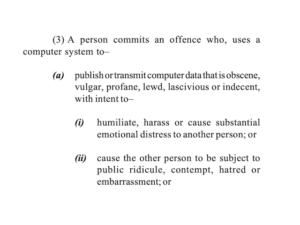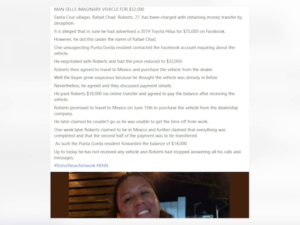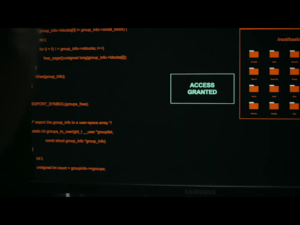What Constitutes Cybercrime?
There has been a cybercrime legislation in place since October seventh, 2020. It covers a broad spectrum of offences and deals with any kind of electronic data that one transmits through a computer or electronic device, including cell phones. Cyberbullying, such as what call centre agent, Brian Perriott Junior is charged, is only one form of cybercrime. In this week’s edition of our Five Point Breakdown, we turned to an attorney to expound on not only cyberbullying, but cybercrime. Marion Ali reports.
Marion Ali, Reporting
 You’ll remember Brian Perriott Junior, who was remanded on Friday after he pleaded guilty to intentionally sending another person nude pictures of an ex-girlfriend without her consent. It happened after the young woman ended a relationship with Perriott virtually in June. Three nights behind bars and hearing that he was looking at a five-year-sentence was enough for the twenty-six-year-old to change his mind, and his plea. When he appeared in court for what was to be his sentencing, he decided to plead not guilty. Perriott lawyered up and got bail on several conditions, including that he is not to engage in any publications on any social media platform regarding the case. There have been quite a few cyberbullying incidents in the recent past. At the end of June, images of a popular Belizean couple and several young women went viral. Before that, a woman, Jemine Thurton was charged in May with defrauding Celebrity Restaurant. The offenses are serious, but there are other less popular forms of cybercrime. Attorney, Audrey Matura defines what cybercrime is.
You’ll remember Brian Perriott Junior, who was remanded on Friday after he pleaded guilty to intentionally sending another person nude pictures of an ex-girlfriend without her consent. It happened after the young woman ended a relationship with Perriott virtually in June. Three nights behind bars and hearing that he was looking at a five-year-sentence was enough for the twenty-six-year-old to change his mind, and his plea. When he appeared in court for what was to be his sentencing, he decided to plead not guilty. Perriott lawyered up and got bail on several conditions, including that he is not to engage in any publications on any social media platform regarding the case. There have been quite a few cyberbullying incidents in the recent past. At the end of June, images of a popular Belizean couple and several young women went viral. Before that, a woman, Jemine Thurton was charged in May with defrauding Celebrity Restaurant. The offenses are serious, but there are other less popular forms of cybercrime. Attorney, Audrey Matura defines what cybercrime is.
What is Cybercrime?

Audrey Matura
Audrey Matura, Attorney at Law
“The cybercrime legislation deals with any kind of electronic data that you transmit through a computer. And a computer doesn’t mean only a desktop. Even your phone is considered, for the purpose of the legislation, a technology that is within the realm of a computer. And so it involves people creating fake identities to be able to online. People using their device or computer, whatever, to fabricate false information, to steal your data, to steal your identity, even to lure minors into doing things that are not proper. It’s actually very wide. That is why it’s called cybercrime. It’s crimes that are committed using the technology. Crimes of theft, identity theft is a huge one; crimes of sexual solicitation, especially against minors.”
Penalties Range from Fines to Confinement

The penalties for cybercrimes vary from fines to imprisonment of up to ten years, depending on the types of offences committed, and they can be tried summarily by a magistrate or by a High Court judge. The list of cybercrimes is lengthy. For example, were you aware that if you gained access to a computer system or data without permission you are committing a cybercrime?
 Audrey Matura
Audrey Matura
“I just read through some of the offenses so that people are aware of theirs. Illegal access to computer system. Illegal access to computer data. Illegal data interference. Illegal system interference. Illegal devices and codes. Computer related forgery. Identity related fraud. Identity related theft and child luring. And of course, the others you already knew.”
Media Houses Beware
Then there’s an aspect of cybercrime that holds media houses responsible for derogatory comments that individuals make on their social media pages.
 Audrey Matura
Audrey Matura
“Sometimes I see some of the most outrageous comments calling people thieves, rapists, and all kinds of things with no evidence. The onus is on the media houses to go remove those things because then they can be arrested and charged. There is provision.”
Marion Ali
“For?”
 Audrey Matura
Audrey Matura
“To me it would be under Section 15, so you can be charged as an individual and you can still be charged as a corporation so you can’t hide and say oh it is a company or so you can’t charge me.”
Marion Ali
“What would be the charge?”
 Audrey Matura
Audrey Matura
“[Section] 15 says using a computer system to coerce, harass, intimidate, etc., a person, but this is the part that I think of the most. It says a person commits an offense who uses a computer system (and that could be your phone) to a publish or transmit computer data that is obscene, vulgar, profane, lewd, lascivious, or indecent with the intent. So what is the intention? It has to be that you want to humiliate the person. You want to harass the person or cause substantial emotional distress, or cause the other person to be subjected to public ridicule, contempt, hatred, or embarrassment.”
You Could Be Charged for your Fake Account
What is difficult to litigate against, Matura says, are social media posts that don’t call any names but are offensive to a class of people. But what is not difficult to prosecute are people who create fake Facebook accounts.
 Audrey Matura
Audrey Matura
“People make fake accounts and they put fake names. And so you need to – the police has actually has the ability.”
Marion Ali
That’s a crime too?
Audrey Matura
“Yes, that in itself is a crime, but the police have the ability to be able to track these things. And they should there is a protocol that I understand that you can contact Facebook for police purposes and get information. There’s ways if you want to do it.”
 But the attorney questions whether Belize is equipped to successfully prosecute cybercrimes.
But the attorney questions whether Belize is equipped to successfully prosecute cybercrimes.
Successfully Prosecuting Cybercrimes
Audrey Matura
“The question is, do we have the resources? Does the office of the DPP have the resources of what it needs for the technology to prosecute? Does the police have the resources to investigate and gather good evidence? Because you have to gather the evidence. Keeping in mind, too, that there is already legislation that has to do with electronic evidence and for you to be able to admit electronic evidence in any hearing. It requires that you do it within the parameters of the evidence of the electronic evidence.”
Marion Ali for News Five.







Facebook Comments